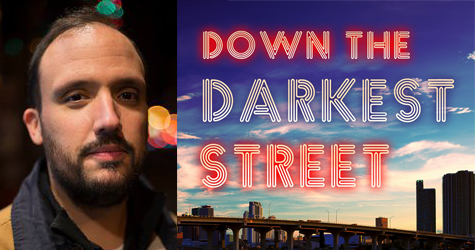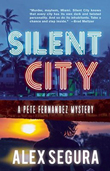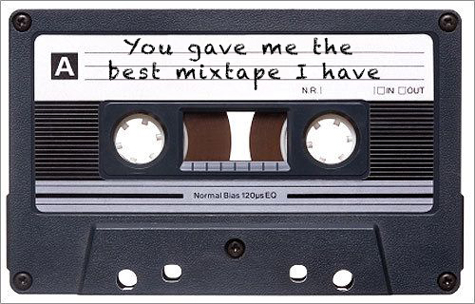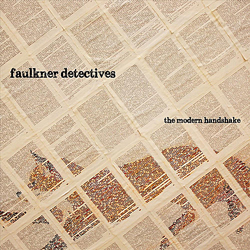
Alex Segura might be the nicest guy in crime fiction. He cheers on his fellow writers and enthusiastically recommends books, comics, and music. In his entertaining newsletter, Stuff & Nonsense, he chats with all sorts from the crime fiction and comic worlds. By day, he is Senior Vice President of Publicity and Marketing at Archie Comics, responsible for those cool reboots you’ve been reading about, or maybe reading. By night, he has written two novels featuring dissolute Miami reporter Pete Fernandez: Silent City and the forthcoming Down the Darkest Street. And, as of February, he is a first-time father.
Given his busy-ness and sleep deprivation, I’m really pleased Alex was up for answering a few music-related questions.
Lisa: The Pete books have an interesting publication story. Can you tell it here briefly?
 Alex: They do, definitely. Silent City was first published in 2013 by Codorus Press, which is a small, independent literary house that focuses on essays and poetry. I'm good friends with Codorus Publisher Wayne Lockwood, and we found ourselves chatting about books at a show in Manhattan in 2012. He was looking for more titles to put out, and I was eager to get Silent City out there, so it made sense.
Alex: They do, definitely. Silent City was first published in 2013 by Codorus Press, which is a small, independent literary house that focuses on essays and poetry. I'm good friends with Codorus Publisher Wayne Lockwood, and we found ourselves chatting about books at a show in Manhattan in 2012. He was looking for more titles to put out, and I was eager to get Silent City out there, so it made sense.
The response to Silent City in terms of reviews and attention was very good, but I knew I wanted a bigger platform for the second Pete novel, Down the Darkest Street. Enter Polis Books, which has been building a killer lineup of crime authors, thanks to Publisher/Founder Jason Pinter—who's a great writer himself. Not only will Polis be putting Down the Darkest Street out in April, but they'll also be reissuing Silent City in March with a new cover to match the sequel.
Lisa: This is a bit of a cheat, since we know each other, but I was wondering how closely Pete's musical taste is modeled on your own?
Alex: Oh, pretty closely, I think. We both have a great fondness for Elvis Costello—Pete even names his cat after him. Maybe “obsession” is a better word than “fondness”?

When I was first cooking up the character, I wanted to write about someone I could relate to and feel some familiarity toward, but was not identical to. Pete is the guy I knew in college, but lost touch with. I'm sure Pete was in the crowd at shows I went to in the Miami area—whether it was Spoon, Neko Case, Sleater-Kinney, Sonic Youth, Pixies, Wilco, or Jonathan Richman, to name a few off the top of my sleep-addled head.
We both have a fondness for Guided By Voices and the Velvets—including Reed and Cale's solo output—not to mention more obvious choices like Springsteen, Neil Young, the Breeders/Pixies/Amps, and the Stones. I'd also wager we both own many Replacements albums on vinyl, though Pete's may have been destroyed. But, I've said too much!
Lisa: What’s the first record (was it a record, or something else) you ever bought? Who is the first band you ever saw live?
Alex: There was always music around the house, so it's tough to pinpoint. I remember my dad listening to a lot of Dylan as a kid—Blood on the Tracks, Desire, and The Basement Tapes, in particular. My parents were big into CDs when that format started to crop up. Though, being a frugal youth, I think I spent a lot of my own money on cassettes—U2's Achtung Baby and Nirvana's Nevermind stand out as early, independent purchases.
Then, I spiraled into a deep Beatles obsession that carried me through high school. Of course, that all blew up when I was bought an Elvis best-of, followed by The Smiths Singles and a borrowed copy of the first Velvet Underground album during my first weeks of college.
I was a slow learner when it came to live shows, but my first concert was U2 during their PopMart tour—which was kind of like Disneyland with rock music. I think I enjoyed the experience of going to the show more than the actual concert, but after that, I was hooked.
A few months later I went to my first Springsteen show—not really knowing what to expect or much of his catalog—and walking out (two-and-a-half hours of music later) converted. It was the first of many euphoric live music moments—like the time my friend Austin and I met (!!!) Mission of Burma after a Bowery show. Surreal.
It's hard to describe the feeling you get from seeing artists you admire recreate music you find so personally moving live, like they're giving you a gift. It's euphoric and special because you know that it can never be replicated exactly again.
Lisa: Over the course of the two novels, Pete changes a lot (which to me is always a sign of a promising series). One of the main things I noticed is that he's far less angry by the time the events of Street transpire. Does his musical taste change too? Or is he forever hung up on the bands of his youth?
Alex: By the second book, Pete's trying to not only solve external problems, but his own personal ones as well, to varying degrees of success. I think his tastes do evolve, definitely. Music has a way of triggering emotional reactions and memories, and I think as we get older, we tend to drift—either by design or just reflex—away from the songs or bands that remind us of bad/awkward times (breakups, aimless periods, lost friends). I see that a bit in Pete, too.
There are records that I love that, for whatever reason, I can't listen to much anymore. They remind me of intense, emotional moments or just jog strange memories. Magnetic Fields 69 Love Songs, Velvet Underground's eponymous record, R.E.M. Monster, Weezer Pinkerton, Neutral Milk Hotel In the Aeroplane Over the Sea, Everything But the Girl Amplified Heart, Wilco Yankee Hotel Foxtrot and A Ghost is Born, the Breeders Title Tk, Liz Phair whitechocolatespaceegg, Rolling Stones Let it Bleed, or PJ Harvey Stories from the City, Stories from the Sea—they all bring me back to another time, so I can't really just pop them on while I do the dishes, y'know?
So I think Pete, who's going through some major changes when we reconnect with him in Down the Darkest Street, is probably experiencing a bit of that—nostalgia for the bands that fueled his chaotic times, like the 'Mats or the Pixies, but also some momentum toward different sounds that might not be as jagged or that don't pull him back toward those dark moments as easily.
Lisa: Have you made playlists for either of the books?
Alex: I have! I actually keep a running playlist going as I write, then whittle it down as I get closer to being done with a first draft, and tinker as I revise. It's usually bands I've been listening to a lot during the writing of the book or artists I think might fit in tonally with the book if it were to have a soundtrack. I did a piece at Largeheartedboy about the playlist I created for Silent City, when it first came out, that was a lot of fun to put together, and not really tough because I had the playlist ready to go.
Spotify makes this sort of thing easier in some ways, but also overwhelming, too. You can choose from any song ever made! It's crazy. As I get closer to finishing a book, I try to adhere to a few minor rules when trimming the list—obviously, I don't repeat songs from previous playlists, I try to not have more than two songs by the same artist (different bands, solo records or other iterations are a loophole I use often, though) and I try to keep it to one CDR in terms of length—about 75 minutes. If I start to veer into double-album territory, I know I've gone off the rails.
I loved making mix CDs in college, and mix tapes before then—I relished the challenge of fitting curated songs into a set time frame and trying to relay some kind of message or theme through the music and the order those songs are played. A mix CD can be such a personal gift, I think, if done right. I hate to sound like an old codger, but I feel like that art's been lost a bit with streaming music. So, making playlists of my books keeps that part of my brain working.

For each book, it's usually a mix of beloved songs that I think fit the “mood” of the book and artists or songs that have piqued my interest while writing or revising. The Down the Darkest Street playlist is much more menacing than Silent City, which says a lot, because I think that track listing is pretty depressing. You'll be happy to know the Street playlist kicks off with Costello's “Shipbuilding.”
There are artists that carry over from playlist to playlist, like David Byrne/Talking Heads, Velvets/Lou Reed/Cale, Breeders/Pixies/Frank Black, Replacements/Westerberg, Jenny Lewis/Rilo Kiley, Galaxie 500/Luna/Dean Wareham, Roxy Music/Bryan Ferry, Neko Case/New Pornos, and Wilco/Son Volt/Golden Smog, with new artists cropping up as I go. I was listening to a lot of Jason Isbell and Low while writing Down the Darkest Street, along with the Decemberists and the Handsome Family, so you see that crop up, too. The book playlists work as soundtracks for the novels if you're a reader, but also serve as a soundtrack to the writing and editing for me, so it's fun to revisit them. I'm still paring down the playlist for the third Pete book, Dangerous Ends (which is currently in first draft form), and just starting the process for the fourth, which I'm still writing.
Lisa: Do you play any instruments? Have any stories about terrible gigs and crazy drummers?
 Alex: I’ve played guitar, or tried to, since high school. I've been in two bands that actually played shows in NYC and Brooklyn. My most recent band, Faulkner Detectives, is on hiatus (I'm mostly to blame—juggling a full-time job, writing novels, and now being a dad meant something had to give). But you can still find our EP, The Modern Handshake, on most streaming services. I'm hesitant to describe the music, but it's definitely indie with a heavy dose of post-punk and some unexpected twists in there. I do miss being in a band, and in that band in particular, so I hope that we can align our schedules enough to get back to it. There just aren't enough hours in the day. Cue the violins.
Alex: I’ve played guitar, or tried to, since high school. I've been in two bands that actually played shows in NYC and Brooklyn. My most recent band, Faulkner Detectives, is on hiatus (I'm mostly to blame—juggling a full-time job, writing novels, and now being a dad meant something had to give). But you can still find our EP, The Modern Handshake, on most streaming services. I'm hesitant to describe the music, but it's definitely indie with a heavy dose of post-punk and some unexpected twists in there. I do miss being in a band, and in that band in particular, so I hope that we can align our schedules enough to get back to it. There just aren't enough hours in the day. Cue the violins.
I dealt with a lot of drummer drama in Miami—where it felt like I was in a different band every week. But that was probably a byproduct of my own immaturity. Being in a band is work, and if you don't treat it like a job, you won't get professional results. Everyone loves the idea of being in a band. It's fun to talk about! But the actual doing is time-consuming and not easy. Plus, it's almost impossible to find that right mix of people—where you attain the balance of leaders and contributors and also the right collaborators that allow you to feel comfortable enough to lay yourself bare and write songs.
At this point, with my schedule as it is, I'm happy jamming with my six-year-old nephew every few weeks and playing guitar as a way to blow off steam. But, maybe when the baby is older and I find a little bit of time to practice with other like-minded people.
In terms of gigs…the dozen or so I've played remind me a lot of book events, with the volume turned up and the alcohol consumption about the same. Some are awesome, blood-pumping events where you feel you hit every chord correctly and actually improved on the songs and got the right reaction from fans (especially if there are *strangers* there, as opposed to just friends/family).
Some are terrible, feature only a handful of people, bad venue/equipment, and just poor execution. You're just off sometimes, and that's okay. The best live music advice I ever got was that not everyone knows what you're supposed to be playing, so if you muff a string or mumble a verse, no one knows but you and your bandmates. That can only make you feel so much better, though. A bad gig is a bad gig, and you have to either power through it and play another one or hang it up.
While I'm a pretty social person—I do PR for a living—I get really anxious before a show. I need to really get into the right headspace to make it work. Even the booking of shows is riddled with anxiety. With Faulkner Detectives, we'd joke that the only way we'd prepare for a show is if we booked it and then had to cram/practice in advance so we didn't make fools of ourselves. I can't imagine we were unique in that, but that's how we did it.
Most of our shows were fun, and I feel like we got better playing live. There's a camaraderie that comes from being in those unique trenches together you don't get anywhere else, and the rush from the applause can't be beat.
Lisa: Do you listen to music when you write?
Alex: Nope. I need silence or as close to silence as I can get. Songs with lyrics are too distracting. I start thinking about the song—“Who played guitar on this track?” “Which album is this one off?”—and it takes me out of the writing. It's a shame. I wish I could pop in a record or two to write, but it just doesn't work. I've tried instrumental music, too, but then I spend too much time trying to find something to play, and next thing I know, I have to go do something else. It's better for me to just find the time, write, and then think about the musical aspects of the writing later.
Lisa: Since you are a brand-new father you must have thought about this. What bands are you most excited to introduce your son to?
Alex: A ton! Though, I realize that those might be the very bands he rebels against. But, maybe eventually he'll come around and realize “huh, dad had decent taste in music.”
We've been playing a lot of Beatles around the house, in advance of his arrival and now that he's here. But, I don't count them because their music is kind of universal.
I'm excited to turn him onto the bands that got me into music and wanting to play music, like Elvis Costello (usually with the Attractions), Talking Heads, Roxy Music, Yo La Tengo, Sleater-Kinney, Sonic Youth, Velvet Underground, Pixies/Breeders, Pavement, Wilco, Dylan, Neil Young, and the Replacements, not in any particular order. I do have to say, I am sad he'll never live in a world with David Bowie on it, but I am definitely excited to see his reaction to some of my favorite Bowie records, like Low and Station to Station.
Lisa: In addition to writing crime fiction, you also work at Archie Comics and have written comics as well. I'm curious about how you think fandom works in these different subcultures—comics, crime fiction, and music.
Alex: They’re all very passionate, for sure, but in different ways. In comics, people have more brand loyalty, which you don't see in crime or music. No one says, “I only listen to Reprise Records!” or “I only buy Mulholland Books!” At least not to the same degree comic fans do, or did, when I was first collecting them.
I think in all three, the fandom comes from a strong love for the medium that can sometimes veer into obsession. I know I was really hyper-detailed when it came to comics as a kid, in terms of which ones I collected and why. When I was a kid, I could rattle off what happened in the first hundred issues of Amazing Spider-Man. Later on in my life, I could probably list all the Beatles B-Sides and when they were recorded. And so on.
I don't say these things as if they're rare or crazy—in fact, they're pretty common for fans of each thing. It's just symbolic of the passion and excitement comic/music/crime fiction fans have.
There's a lot of overlap, too. I know a ton of crime authors who have long histories with comics, or some who write comics very well, like Duane Swierczynski, Greg Rucka, or Victor Gischler, to name a few. I've also had some of my best music conversations with fellow comic book creators and other authors.
I think at a certain point, as a creative person, you have to focus on one passion that you want to convert into a career. But, that doesn't make you any less passionate about the others. I'm lucky enough to work in comics and write mysteries. But, I still love music and can at least remember that time I played it live with my friends. And who knows? Maybe down the line you can shift between them and focus on another for a while.
Alex Segura is a novelist, comic book writer, and musician. Alex is the author of the bestselling Archie Meets Kiss series and graphic novel from Archie Comics. Alex also performs regularly in New York as part of the indie rock group Faulkner Detectives. He lives in New York City with his wife and two cats. He is a Miami native.
Lisa Levy is the former EIC of The Life Sentence and the former Mystery/Noir editor at the LA Review of Books. She also has written about less nefarious topics for Pacific Standard, Dame, The Believer, Slate, Salon, and other publications. She is also a contributing editor and columnist at Literary Hub.

ood article-I could hear those tunes you mentioned. My all time favorite was the Perry Mason theme.